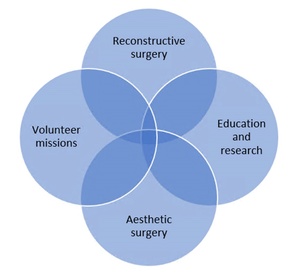I recently found myself an invited speaker at a career breakfast at my son’s school. Various accomplished professionals from different fields were present to impart their career advice to the older boys over breakfast. Lawyers, developers, entrepreneurs and corporate CEOs were all present. I was the token medical doctor but chose not to talk about a career in medicine but instead spoke about a balanced life based on the Japanese concept of Ikagai.1
Ikagai is a Japanese word derived from ‘Iki’ for ‘life or alive’ and ‘Kai’ for ‘effect or result’. It roughly translates to ‘reason for being’, ‘a worthwhile life’ or ‘the reason you wake up in the morning’. The French would call it ‘raison d’etre’.
The presence of Ikigai correlates with low levels of stress and an overall feeling of being healthy. Okinawans (Japanese people from the islands of the East China sea) who practice Ikagai are some of the longest living humans on the planet. An individual’s Ikagai is very personal; it is a mental state allowing one to feel at ease and give satisfaction and meaning to life.
The concept is beautifully represented in Figure 1.2 One can divide one’s career into four intersecting areas and only balance between all four gives you a fulfilled and meaningful life.
-
do what you love
-
do what you are good at
-
do what the world needs
-
do what someone will pay you for.
One can look at any career and see lack of balance. For example, the stockbroker who earns a lot of money, is good at what they do, but perhaps the world doesn’t really need it, and they don’t love it. Trying to make lots of money in the hope that it can provide leisure and therefore Ikagai is a mistake. They might need to undertake philanthropic pursuits to provide what the world needs and balance their Ikagai.
In the same vein, a charity worker can be doing what the world needs and love it but not getting enough pay to provide a good life for their family.
Plastic surgery is career that can provide excellent balance over all four areas of our lives:
-
We love what we do
-
We are well trained and good at it
-
We are well paid compared to some other specialties, and
-
a lot of what we do, the world needs.
The last two components can be a trap for us. The pursuit of more lucrative cases that we may not really love can put our Ikagai out of balance. Going down the rabbit hole of social media, chasing reviews and pursuing high paying aesthetic surgery seems to be the goal of many of our junior surgeons but are they heading for an unbalanced Ikagai?
Retaining a diverse case mix, including the reconstructive surgery that the world needs, that you love doing and are good at, will keep your Ikigai in balance. Equally a strong aesthetic practice might be balanced through scientific research, education, volunteer aid missions or getting involved with your society’s governance.
Of all the medical specialties plastic surgeons probably have the highest potential for a lack of balance in our Ikigai due to the inherent duality of the profession and the temptations that it can bring. We need to continually review and reassess our practice as it matures and always be prepared to make the changes that we need in order to keep balance throughout our working lives.
Published: March 22, 2020 AEST
Updated: June 23, 2021 AEST—new formatting



